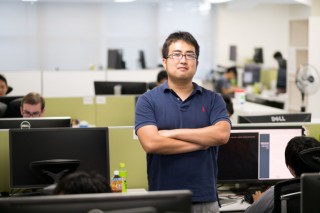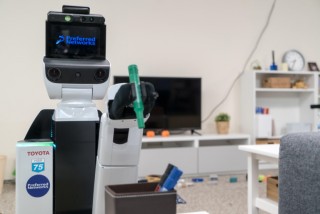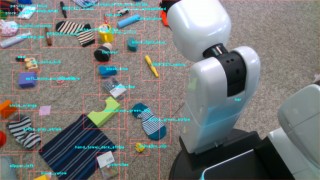Loading
Search
▼ How Japan Uses AI And Robotics To Solve Social Issues And Achieve Economic Growth
- Category:Other
Automation has become part of the global manufacturing line, where robots take on repetitive jobs, like filling boxes or welding a car frame in the same way, day after day.
But what if robots could step away from their limited range of tasks, and start to problem solve in complex operational situations, like spotting a malfunction on the assembly line or identifying a better compound for a part?
And how could robots enabled with “deep learning” – where algorithms learn from large amounts of data collected via experience – begin to share insights with other robots, to increase innovation in all kinds of settings, from factories to self-driving cars on the road to early cancer detection and drug discovery in hospitals?
These questions are the focus of Preferred Networks, a cutting-edge artificial intelligence company founded in 2014. The Tokyo-based firm, which is worth roughly $2 billion, according to CB Insights, is a symbol of Japan’s sweeping strategic innovation initiative, where AI and robotics are viewed as keys to both solving social issues and achieving new economic growth.
That solutions-based approach is crucial for Japanese companies in the highly competitive AI technology arena that is dominated by U.S.- and China-based companies that have attracted billions of dollars in funding, says Preferred Networks co-founder Okanohara Daisuke. “Since our founding, we’ve said that our company would focus on addressing problems in the real world, not the virtual world,” he says. “That coherent policy and stance, as well as continuous achievements, are highly valued by our partners.”
Preferred Networks’ recently announced partnership with Toyota is an example of Japan’s focus on deployment of AI and deep learning to solve immediate challenges. The project is designed to develop service robots that can assist people in everyday life.
This could fill a critical need in Japan, where an aging population and tight labor market makes it difficult to ensure there are enough services for the elderly at home, and in health care settings.
The two companies will collaborate on research and development using Toyota’s Human Support Robot (HSR), a platform that allows robots to work beside people offering basic care and support assistance in nursing and long-term care applications. Equipped with one arm, a display, cameras and a wheeled base, it can automatically collect and retrieve items, and provide remote control and communication capabilities.
In Japan – and elsewhere in the world – this is the kind of innovation that can help address many of the challenges the society faces, says Akaishi Koichi, Vice Minister, Innovation Policy, in the Japanese Cabinet Secretariat.
Akaishi describes Japan as rapidly moving towards “Society 5.0,” as the world adds an “ultra-smart” chapter to the earlier four stages of human development: hunter-gatherer, agrarian, industrial and information.
Akaishi said that in Society 5.0, where all things are connected and integrated through technology, Japan is focused on helping companies, including start-ups and “hidden gems” among small and midsize enterprises, to come up with brand-new and innovative ideas, in order to provide the world with solutions. As the third biggest economy globally, Japan was once a leader when it came to disruptive innovative technology: Think pocket calculators, the Sony Walkman and LED lights. As Silicon Valley and Chinese developers began to explore IoT, big data and AI, Japan fell behind. Now with Japan facing so many challenges, Akaishi says the country is poised to embrace AI and leverage its solutions.
In order for more “hidden gems” companies like Preferred Networks to emerge, the Japanese government is supporting a wide range of reforms in areas that range from education to regulatory policy and finance, says Akaishi. Among the initiatives:
Akaishi says that with these initiatives, Japan will become a country with widespread AI literacy. Rather than fear the implications of automation and robots, he says, Japan has set up a policy council to identify ethical and legal implications of AI and create new policies. But Akaishi believes the country will embrace AI as a new tool for creating the future.
Japanese technology workers will not only find new opportunities at home, but will find more collaborative opportunities abroad.
“We are facing fundamental change in our work and our society and AI will make a tremendous impact,” Akaishi says. “We have the opportunity to make huge changes.”
But what if robots could step away from their limited range of tasks, and start to problem solve in complex operational situations, like spotting a malfunction on the assembly line or identifying a better compound for a part?
And how could robots enabled with “deep learning” – where algorithms learn from large amounts of data collected via experience – begin to share insights with other robots, to increase innovation in all kinds of settings, from factories to self-driving cars on the road to early cancer detection and drug discovery in hospitals?
These questions are the focus of Preferred Networks, a cutting-edge artificial intelligence company founded in 2014. The Tokyo-based firm, which is worth roughly $2 billion, according to CB Insights, is a symbol of Japan’s sweeping strategic innovation initiative, where AI and robotics are viewed as keys to both solving social issues and achieving new economic growth.
That solutions-based approach is crucial for Japanese companies in the highly competitive AI technology arena that is dominated by U.S.- and China-based companies that have attracted billions of dollars in funding, says Preferred Networks co-founder Okanohara Daisuke. “Since our founding, we’ve said that our company would focus on addressing problems in the real world, not the virtual world,” he says. “That coherent policy and stance, as well as continuous achievements, are highly valued by our partners.”
Preferred Networks’ recently announced partnership with Toyota is an example of Japan’s focus on deployment of AI and deep learning to solve immediate challenges. The project is designed to develop service robots that can assist people in everyday life.
This could fill a critical need in Japan, where an aging population and tight labor market makes it difficult to ensure there are enough services for the elderly at home, and in health care settings.
The two companies will collaborate on research and development using Toyota’s Human Support Robot (HSR), a platform that allows robots to work beside people offering basic care and support assistance in nursing and long-term care applications. Equipped with one arm, a display, cameras and a wheeled base, it can automatically collect and retrieve items, and provide remote control and communication capabilities.
In Japan – and elsewhere in the world – this is the kind of innovation that can help address many of the challenges the society faces, says Akaishi Koichi, Vice Minister, Innovation Policy, in the Japanese Cabinet Secretariat.
Akaishi describes Japan as rapidly moving towards “Society 5.0,” as the world adds an “ultra-smart” chapter to the earlier four stages of human development: hunter-gatherer, agrarian, industrial and information.
Akaishi said that in Society 5.0, where all things are connected and integrated through technology, Japan is focused on helping companies, including start-ups and “hidden gems” among small and midsize enterprises, to come up with brand-new and innovative ideas, in order to provide the world with solutions. As the third biggest economy globally, Japan was once a leader when it came to disruptive innovative technology: Think pocket calculators, the Sony Walkman and LED lights. As Silicon Valley and Chinese developers began to explore IoT, big data and AI, Japan fell behind. Now with Japan facing so many challenges, Akaishi says the country is poised to embrace AI and leverage its solutions.
In order for more “hidden gems” companies like Preferred Networks to emerge, the Japanese government is supporting a wide range of reforms in areas that range from education to regulatory policy and finance, says Akaishi. Among the initiatives:
- Educational reform is moving schools away from a culture of memorization to learning focused on problem-solving. Data literacy will be emphasized at elementary and secondary schools, where the government has funded computers and technology implementation.
- More certifications and grants from the government to Japanese universities offering AI education to ensure a growing pool of qualified developers and workers.
- Promotion of Japan’s AI research initiatives, universities and networks to the global community in an effort to attract overseas research projects to Japan.
- Unification of data formats and standards in various industries will enhance the ability to deploy big data across companies and settings.
- A new regulatory review process is making it easier for companies to launch experimentation and bring innovation to the marketplace.
- Programs are creating new data privacy standards that could be internationalized.
- New tools are helping start-ups find financing within and outside Japan.
Akaishi says that with these initiatives, Japan will become a country with widespread AI literacy. Rather than fear the implications of automation and robots, he says, Japan has set up a policy council to identify ethical and legal implications of AI and create new policies. But Akaishi believes the country will embrace AI as a new tool for creating the future.
Japanese technology workers will not only find new opportunities at home, but will find more collaborative opportunities abroad.
“We are facing fundamental change in our work and our society and AI will make a tremendous impact,” Akaishi says. “We have the opportunity to make huge changes.”
- February 6, 2020
- Comment (0)
- Trackback(0)




